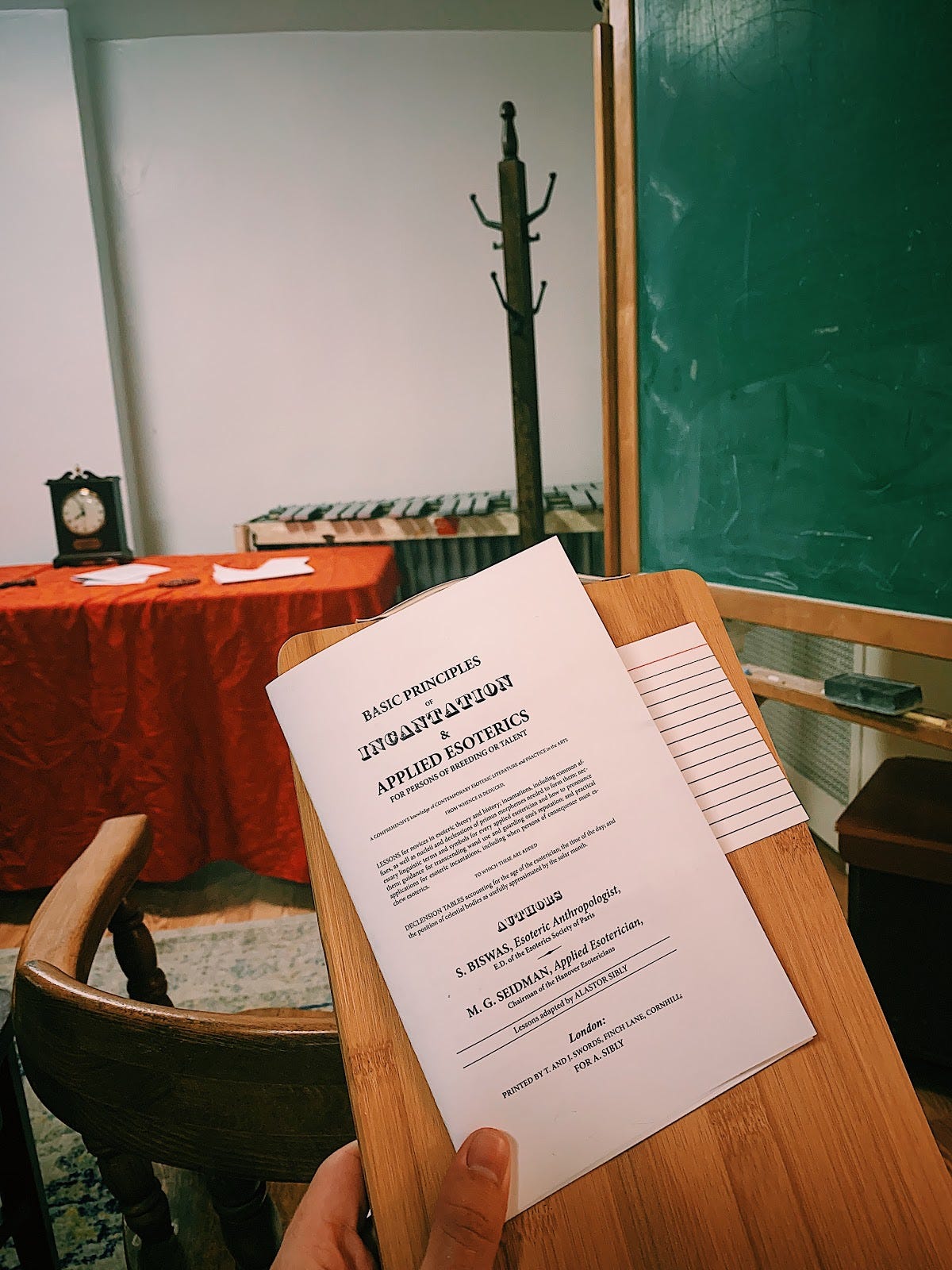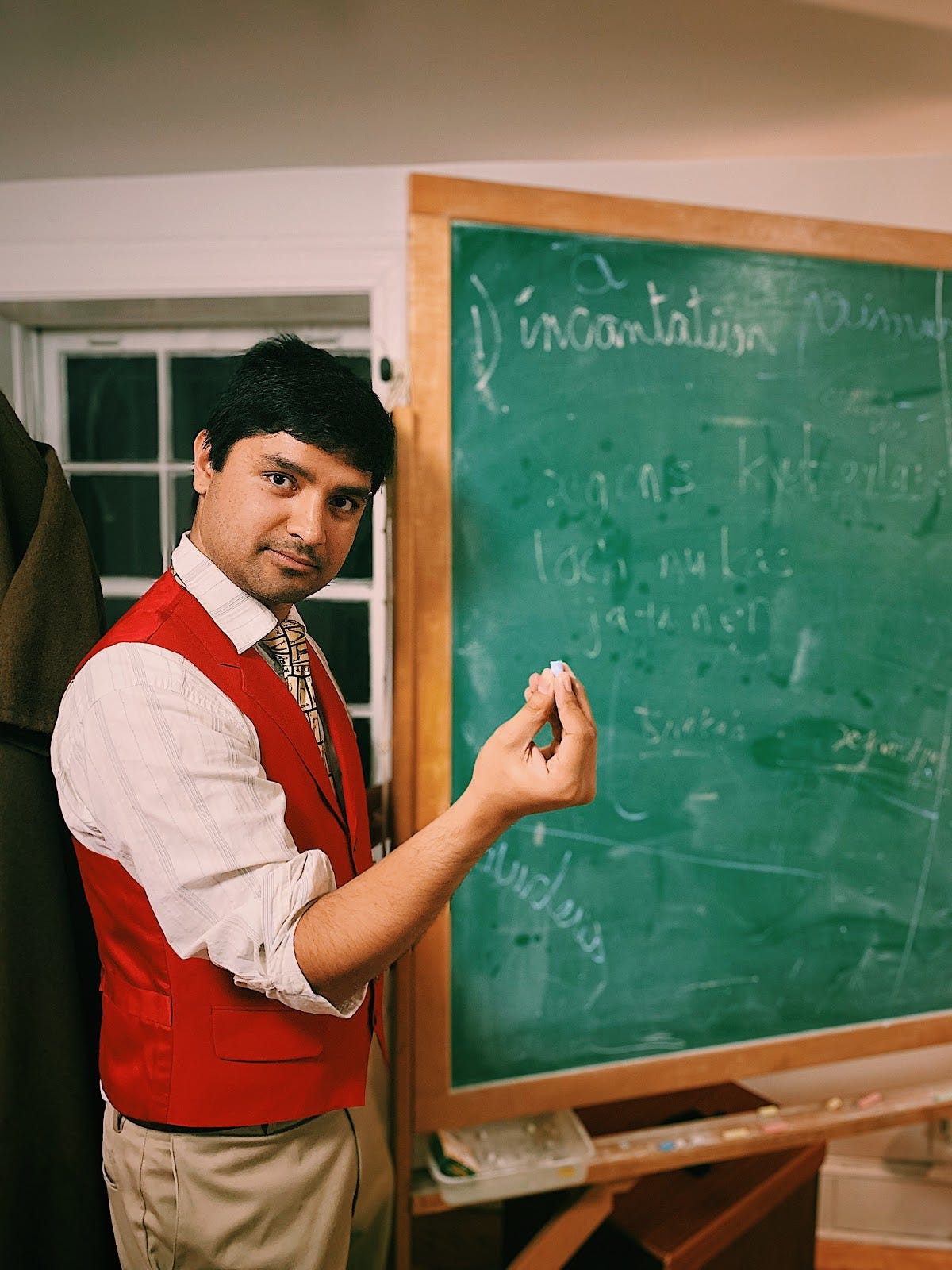
As a quintessential British Millennial, I am proud of my Harry Potter obsession. Yes, I have been to the “real” platform 9 and ¾ at Kings Cross Station in London. Yes, I have attended all of the midnight book launches. And of course, yes I have my house scarf (Slytherin). Reading the Harry Potter series was an important part of my development as a child, and helped to nurture my love of reading. Escaping for a few hours into the world of wizardry has always been a pleasure. The adventures of Harry, Ron, and Hermione will live with me…always. For so many of us who grew up with Harry Potter, the world of magic felt so tangible, so real; J.K. Rowling’s creation has a way of staying with you. I have often wondered what it would be like to at student at Hogwarts. What would it be like to receive your acceptance letter? What would a childhood surrounded by magical beings and objects have been like? What would it be like to be in class with The Boy Who Lived?
The immersive production Basic Principles of Incantation & Applied Esoterics for persons of breeding or talent created by Max Seidman and Sharang Biswas answers this exact question. In a small classroom in the West Village, we are invited to join Professor Alastor Silby in the study of Esotery. Firstly our professor states, “We choose to refrain from using such vulgar terms as magic, sorcery, or spells in this class.” Dressed in a bright red waistcoat, with a rather fantastical alphabet-themed tie, Professor Silby (played by Biswas) is instantly enchanting and likable. He exudes confidence and love for his subject while lecturing at breakneck speed with wit and charm. His slight British accent takes me straight back to my school days, as well as my imagined days in Hogwarts.
His intern, Penbrook (Seidman) sits to one side, also wearing a rather dashing waistcoat, ready to assist his professor at a moment’s notice. He too is clearly a man of magical talents. But poor Penbrook, however, is often the butt of Silby’s jokes and occasionally the subject of his spells. Unfortunately, I don’t think Penbrook was referred to once with the correct name by Professor Silby throughout the class, resulting in a series of “Uh, you, Primrose” and “Excuse me, Pompernoose” as well as “Do pick that up, Puffin.” I found myself chuckling at this beleaguered young man regardless. The two of them feel like a classic comedic vaudeville pairing, albeit in a classroom setting.
On my chair, I find a small textbook. Perusing the pages, I quickly feel completely out of my comfort zone. It is classic academia, with hard to understand wording and the feel of being lectured at by a 19th-century professor. It reads exactly like a historical tome, plucked out of a sorcerer’s library, and now sitting on my lap. I am immediately transformed into the role of student wizard, although perhaps I feel more like a Neville than Hermione.
The entire class is a devoted testament to the performers’ and creators’ love of language. Etymology, Phonetics, and Orthoepy form the primary basis of the session, as we read the intricate and detailed “graphemes” — for regular folks like me, it’s working out how to say particularly difficult written out pronunciations. For instance, a basic incantation is made up of a Tripartite ugglinetive structure, meaning the phrase is a Tripartite Agglutinative Incantation (itself made up of the onset, media, and coda). The Primus Morphene is comprised of the Incantation, esotericism, environs. Which in turn are affected by three things: Pronunciation, Enunciation and Focus. The wave of confusing new terminology washes over me but Professor Silby’s love for language is infectious, holding our hands enough to pull us into the experience (Biswas himself is a multilingual performer). I have no idea what I am doing, but I know that every moment is pure and true.
As the class proceeds, increasingly strange and bizarre spells are cast, and we witness their effects firsthand (in part helped by modern sound design and technology). Occasionally a particularly strong answer from a student is rewarded with a smile and a “merit.” When I am handed my first merit, I am amazed at my own reaction to this small brown bead. An item of no significant value, or any real value at all, felt simply magical. I found myself sitting up straighter, and working harder, trying to catch the attention of the professor. A simple tool in the arsenal of a good teacher had a profound impact. I am pulled further into the world of the show with this simple mechanism. By the end of class, of course, something goes terribly wrong; our professor becomes incapacitated, and it is up to us to revive him, using all the tools we have just learned in class.

Greater lore is hinted at through the gameplay in Basic Principles, which is frustratingly intriguing. The professor is quick to praise the fantastic work of a young lady (apparently a Duchess) who sits in the front row of the classroom. Meanwhile, the poor souls in the back of the room are referred to as the “scholarship” students and any success from the back tier greeted with skepticism and shock. “Perhaps there is room for you after all,” muses Professor Sibly. I am surprised to find that the hints of a greater world outside the classroom help to solidify the world inside the classroom. This world-building is so strong, I wonder whether in the future we will see Basic Principles of Incantation being included as a piece within other magical LARP’s or immersive creations. It certainly works as a stand-alone piece, but I can just imagine the possibilities of going from classroom to classroom throughout an entire evening’s worth of programming. The show was so successful that several audience members asked whether there really would be more classes next week (or at some point in the future) — they were eager to take the Advanced Incantations course, if available.
Get Edward Mylechreest’s stories in your inbox
Join Medium for free to get updates from this writer.
SubscribeSubscribe
In real life, I am a music teacher, working my way around New York City, teaching children the fundamentals of music. Sitting in Professor Silby’s class, I suddenly found myself thinking of some of the children I work with.
Is this what it must feel like to them when I use these new and bizarre musical terms? Do they feel the same sense of bewilderment as they begin a new area of study? Do I exude the same amount of confidence and love for the subject as the teacher in this show? How can I create a connection like the one I am feeling now? Am I helping or hindering a love for music? How can I be more like Professor Silby for my students?
Basic Principles of Incantation challenged me on multiple levels. It made me consider myself as a student and how I behave in new learning environments. It made me long for those days when education was my only goal. As a teacher, I was moved to consider how I might alter my methodology to best inspire and educate. Great immersive work has a way of staying with you. I have thought back to this short class many times over the last few weeks, often times when I am preparing to teach my own students. This experience has had a magical experience on me. (And, yes, a merit system has now made its way into my classroom.)
So: for creating a renewed sense of inspiration, for challenging this old student, and for teaching me something new:
10 points to Professor Silby (and his poor assistant, Pom-Pom).
Basic Principles of Incantation has concluded.
NoPro is a labor of love made possible by our generous Patreon backers. Join them today!
In addition to the No Proscenium web site, our podcast, and our newsletters, you can find NoPro on Twitter, Facebook, YouTube, Instagram, in the Facebook community Everything Immersive, and on our Slack forum.
Office facilities provided by Thymele Arts, in Los Angeles, CA.


















Discussion